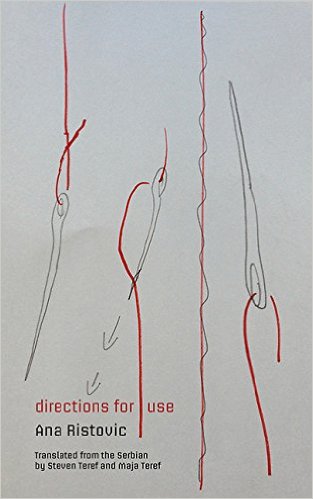Translator
I translate from Bosnian, Croatian, Montenegrin, and Serbian (BCMS) with Maja Teref. In the late 1990s, I studied what was then called Serbo-Croatian at the University of Illinois at Chicago with the Serbo-Croatian linguist Biljana Šljivić-Šimšić. Recent translation projects include the poetry and plays of Milena Marković and the work of Yugoslav avant-garde writers Branko Ve Poljanski and MID [Mita Dimitrijević]. Previous writers whom Maja and I have translated include contemporary poet Ana Ristović and the late Novica Tadić. My specialty is in translating BCMS poetry. I have chosen writers from the early 20th century to the present. I believe in working outside my comfort zone and embrace the unexpected challenges in each writer I translate.
Milena Marković—sympathy for the salami
Milena Marković (b. 1971) is an award-winning poet, playwright, screenwriter, and professor of dramaturgy. She has published seven poetry collections. Her latest collection is the 2021 novel-in-verse Deca [Children], which has been staged as an opera for the National Theatre in Belgrade, Serbia and a play by the De Facto Theatre in Zagreb, Croatia. Her own plays have been staged across Europe and in the United States and she has written screenplays for film and TV, such as Patria, winner for Best Screenplay at the FEST International Film Festival. In November 2024, Marković was made a member of the prestigious and influential Academy of Sciences and Arts of Serbia (SANU).
MID [Mita Dimitrijević]—The Sexual Equilibrium of Money
MID was the pseudonym of a Mita Dimitrijević, of whom little is known. He was a major yet elusive figure affiliated with zenithism, a 1920s Yugoslav avant-garde movement that embraced cross-genre writing as a central tenet of their poetics. He published two books, Seksualni ekilibr novca (The Sexual Equilibrium of Money, 1925) and Metafizika ničega (The Metaphysics of Nothing, 1926), and two short prose pieces, both titled “Form Devours Spirit,” and then he seemingly disappeared. He did exist because several witnesses, including Risto Ratković (a contributor to the 1920s Yugoslav avant-garde magazine Zenit) and Djordje Kostić (a member of the Belgrade surrealists), confirmed they met MID and read his two books. In addition, the Serbian poet Dragutin Kostić dedicated his poem Umesto ludila [Instead of Lunacy] “to Jack the Ripper of all lies and a universal Zarathustra, my dear friend MID—Mita Dimitrijević, a poet and philosopher.”
Maja’s and my translations of MID’s Sexual Equilibrium of Money appear in Zenithism (1921–1927): A Yugoslav Avant-Garde Anthology (Academic Studies Press, 2023).
Branko Ve Poljanski
Branko Ve Poljanski (1898–1947) was a leading figure of zenithism, a 1920s avant-garde literary and art movement unique to the then Kingdom of Serbs, Croats, and Slovenes marked by cross-genre styles filtered through a pan-avant-garde aesthetic that was a synthesis of expressionism, futurism, Dada, and constructivism.
Between 1921 and 1922, Poljanski published a string of periodicals: Svetokret [Worldwhirl], Kinofon [Filmphone], Dada-Jok [Dada-Nope], Zenit-Ekspres: Dada-Jok, no. 2, and the leaflet Zenit-Ekspres: Radiogrami [Zenith-Express: Radiograms].
Poljanski’s books include the anti-novel 77 samoubica (77 Suicides, 1923) and the poetry collections Panika pod suncem (Panic Under the Sun, 1924), Tumbe (Topsy-Turvy, 1926), and Crveni petao (The Red Rooster, 1927).
In 1927, Poljanski handed out copies of Tumbe and Crveni petao in Belgrade’s Terazije square as a farewell to his literary life. After that, he boarded a train to Paris where he devoted himself to painting.
Maja’s and my translations of Branko Ve Poljanski appear in Zenithism (1921–1927): A Yugoslav Avant-Garde Anthology (Academic Studies Press, 2023).
Ana Ristović—Directions for Use (2017 National Book Critics Circle Award Finalist)
Ana Ristović's erotic, wry, feminist poems concern daily routines (washing laundry, doing crossword puzzles). In her writing she explores inner and outer worlds, sex, and relationships. This bilingual (Serbian and English) selection unveils a rich embroidery of frank sexuality and lyric images.
Ristović has published six books of poetry and won the Hubert Burda Prize for young Eastern European poets in 2005. She also has translated eighteen books of poetry and prose from Slovenian into Serbian, and her own poems have been translated into almost a dozen languages.
On the surface, Ristović's poems read smoothly and almost easily as she wittily and winkingly banters about polishing her nails or doing laundry as she opens the door to her New Belgrade world on the Danube quay. Before one knows, one is seduced into a light-hearted conversation about daily chores and salad-making as "[o]utside, the blizzard howls, with ease and without a care, buries our mutual threshold."
In 2014, the Guardian announced Southbank Centre's list of the fifty greatest love poems of the past fifty years. On that list, Ana Ristović's "Circling Zero" appeared together with the likes of Margaret Atwood, Frank O'Hara, and Chinua Achebe, among many other luminous giants of literature.
Novica Tadić—Assembly
Assembly is an extraordinary bilingual poetry collection from renowned Serbian poet Novica Tadić. A dynamic artist at the height of his poetic powers, Tadić presents to the reader a world that is at once surreal and hauntingly familiar, a world of outlandish encounters and uncanny creatures. His poetry addresses the challenges of surviving as an artist in a Communist society, and themes of victimization, oppression and spiritual pollution permeate much of his work. Assembly is a gently subversive and mischievous collection, a harrowing yet humanizing work that is a stunning testimony to Tadić's outstanding abilities as an artist.




